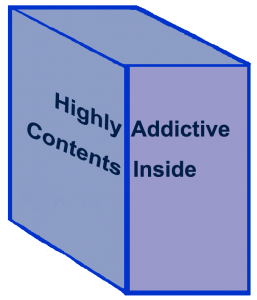Free Yourself From the Addiction Trap
Habit Change Tip #12 (Drop Affirmations)
March 11, 2013Habit Change Tip #13 (Let Magic Happen)
March 18, 2013The box sat in front of a neighbor’s door.
It was unmarked, except for four words wrapped around one corner:
Like it was cute, huh?
But if you’re dealing with addiction – whether it’s in you or in someone you care about, it’s not something to take so lightly, is it?
Reaching for Ten
No matter what the substance or behavior, if you’re like most people, when you drink, use drugs, eat that pastry or play the slots you probably just want to take a break from some stress in life. You want pleasure; you’d like to be at a 10 on the scale. Have you ever said, “I just want to relax,” or “have some fun.” If it was fun, then you got what you wanted.
Can you imagine what it’s like to have a different result – and then to have this experience lead to a different desire altogether? Maybe you don’t have to imagine it at all. It might be that you feel lucky just getting to Zero.
Chasing Zero
This is what it’s like for alcoholics, addicts, chain smokers, habitual lottery players, food cravers et al: While the desire for pleasure may kick off the behavior, the result is often not so much about fun, but instead is relief from a sense of deficit.
“For the first time in my life,” they will say. “It was like a veil lifted. I didn’t even realize I’d been buried below ground. That first snort, toke, drink, spin, lifted me out of a cave. I didn’t feel nervous any more. It was the first time I felt comfortable in a social gathering. I felt the way I thought normal people felt all the time.”
Almost thirty years ago, I met Sister Janet Rolando at my first training experience at Chrysalis House, a recovery program for women alcoholics in Oakland. She was the director and I remember an afternoon when she predicted that eventually everyone would know that alcoholism was caused by genetics. There was no room in Sister Janet for blaming the women, even though they were experts in self-blame.
She understood, even though science was just beginning to get a clue, that there was a reason only some people got hooked when they sought the pleasures of drinking. It was a mystery, just like the cold bug that tapped you on the shoulder and skipped everyone else in the room. Something had to be afoot, since the Irish were cursed and the Chinese were not.
The science has long since caught up. In some ethnic groups, certain genetic markers make it more likely that some people will not be attracted to drinking. But for most humans, neurochemicals in the brain create a pleasurable “high” when we drink, use drugs or even smoke a cigarette. Similar connections are triggered when we exercise and scientists are discovering more about what happens in the brains of people who have eating and gambling problems.
What about Responsibility?
Knowing about the genetic markers for addiction and similar conditions doesn’t absolve us from responsibility. We’re all built to send ourselves warning signs when we overdose. And if you’re wired toward addiction, then some behaviors have a bigger potential for crash and burn. Once you’ve learned that you have diabetes, after all, you become responsible for managing that disease.
The same is true for any addiction. Even though the biochemistry differs, that hangover from partying too hard on Saturdays or the aftermath of all those heavy meals is a signal to adjust. Genetics may have made you susceptible, but years of behavior got you here. In my experience, you’ll succeed more easily if you don’t try to free yourself on your own. I’ll offer more about that next month.
~ ~ ~
If you feel embarrassed about your addictive behavior and self-help programs just aren’t private enough, let’s find out if I can help you shed the shame of the past and become gratefully addiction-free. Apply for a free discovery session.


